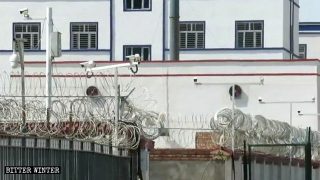The U.S. Senate passed a bill Thursday that would sanction Chinese government officials responsible for arbitrary incarceration, forced labor and other abuses in the Xinjiang Uyghur Autonomous Region, home to internment camps holding as many as 1.8 million Uyghurs and other Muslims.
The Uyghur Human Rights Policy Act of 2020, condemns the Chinese Communist Party for the three-year-old internment camp program and requires regular monitoring of the situation in the XUAR by U.S. government bodies for the application of sanctions once signed into law by President Donald Trump.
Mass incarcerations in the XUAR — as well as other policies seen to violate the rights of Uyghurs, Kazakhs and other Muslims — have sparked calls by the international community to hold Beijing accountable for the abuses, including the use of advanced technology to control and suppress its citizens.
But the U.S. bill, passed unanimously by the Senate, is the first legislation to address the issue. Uyghur activists hailed the Senate vote, urged the House to finish its necessary voting, and called on European states to emulate the U.S. approach to their crisis.
“This represents the first legislative response to the Uyghur human rights crisis, and is an important first step to a more comprehensive policy response. U.S. leadership will help ensure that other nations take similar steps in confronting the Chinese government on its treatment of Uyghurs,” said the Uyghur Human Rights Project.
U.S.-based Uyghur attorney Nury Turkel called the vote “a great day for the Uyghur nation” and welcomed “long overdue legislation that is intended to address one of world’s worst humanitarian crises.”
“I call on the other democratic nations to put in place similar legislation to address the crimes that CCP has committed against the Uyghurs and other Turkic peoples in China,” Turkel told RFA’s Uyghur Service.
“I also hope the democratic nations in the West, especially in Europe, could emulate the actions taken by the US Congress and enact relevant legislation to protect the Uyghur people from Chinese persecution,” said Dolkun Isa, president of the Munich-based World Uyghur Congress (WUC) exile group.
Existential threat as a nation
Thursday’s vote “sends a powerful message of hope and inspiration to the Uyghur people at a time when they are suffering crimes against humanity at the hands of the Chinese government.”
“Today the Uyghurs are facing an existential threat as a nation,” he told RFA.
“The passage of the act will also send a strong message to China that Uyghurs are not alone in this world and the international community stands with the Uyghur people,” added Isa.
The legislation was introduced by Republican Sen. Marco Rubio and Sen. Bob Menendez, the top Democrat on the Senate Foreign Relations Committee.
The version of the bill passed Thursday by the Senate doesn’t include export-control language added last year by the House of Representatives, which must vote on the legislation again before it goes to Trump for his signature.
Once enacted, the legislation requires the administration to submit a report to Congress within 180 days identifying for possible sanctions Chinese officials responsible for torture, prolonged detention without charges and a trial, and other abuses or inhuman treatment of Muslim minority groups in the XUAR.
‘A pathway to bring to account our persecutors’
It also addresses Chinese government harassment of Uyghurs living inside the United States—an increasing threat from Chinese diplomatic missions and Communist Party-controlled United Front organizations in Western countries.
“Today’s action by the Senate sends a clear message that the United States will not be distracted and will not stand by as millions of Uyghur Muslims continue to be unjustly imprisoned, subjected to a mass surveillance state, and forced into labor camps by Beijing’s autocratic regime,” said Menendez.
“The Chinese Government and Communist Party’s systematic, ongoing efforts to wipe out the ethnic and cultural identities of Uyghurs and other Muslim minorities in Xinjiang is horrific and will be a stain on humanity should we refuse to act,” added Rubio.
Since April 2017, authorities in the XUAR are believed to have held up to 1.8 million Uyghurs and other Muslim minorities accused of harboring “strong religious views” and “politically incorrect” in some 1,300 internment camps throughout the region.
While Beijing initially denied the existence of the camps, China last year changed tack and began describing the facilities as “boarding schools” that provide vocational training for Uyghurs, discourage radicalization, and help protect the country from terrorism.
But reporting by RFA’s Uyghur Service and other media outlets indicate that those in the camps are detained against their will and subjected to political indoctrination, routinely face rough treatment at the hands of their overseers and endure poor diets and unhygienic conditions in the often-overcrowded facilities.
“We have spent years struggling to have our voices heard. As the world engaged with China, Uyghurs experienced political repression, economic discrimination, and a loss of our cultural distinctiveness,” said UHRP director Omer Kanat.
“Since 2017, the brutal campaign of mass internment and imprisonment has brought the continued existence of the Uyghur people into question,” he added.
“Today, we have taken a big step to reverse this process. Uyghurs have a pathway to bring to account our persecutors,” said Kanat.
Reported by lim Seytoff for RFA’s Uyghur Service. Written by Paul Eckert.
Source: Copyright © 1998-2016, RFA. Used with the permission of Radio Free Asia, 2025 M St. NW, Suite 300, Washington DC 20036. https://www.rfa.org.


